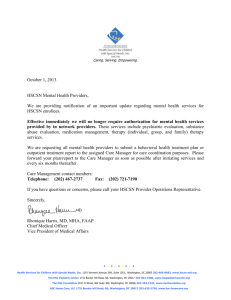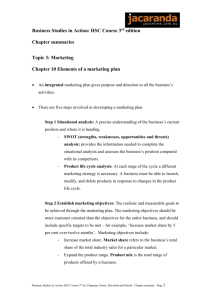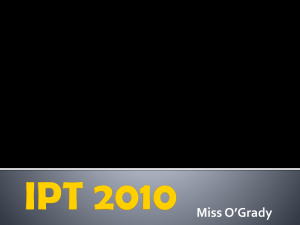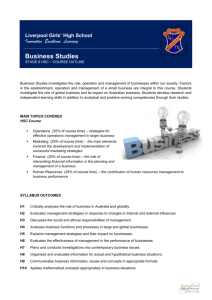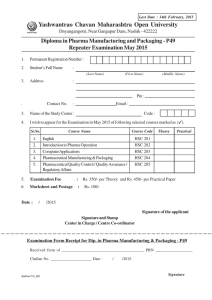Health Sciences HSC 101 Interprofessional Freshman Sem 2 cr
advertisement
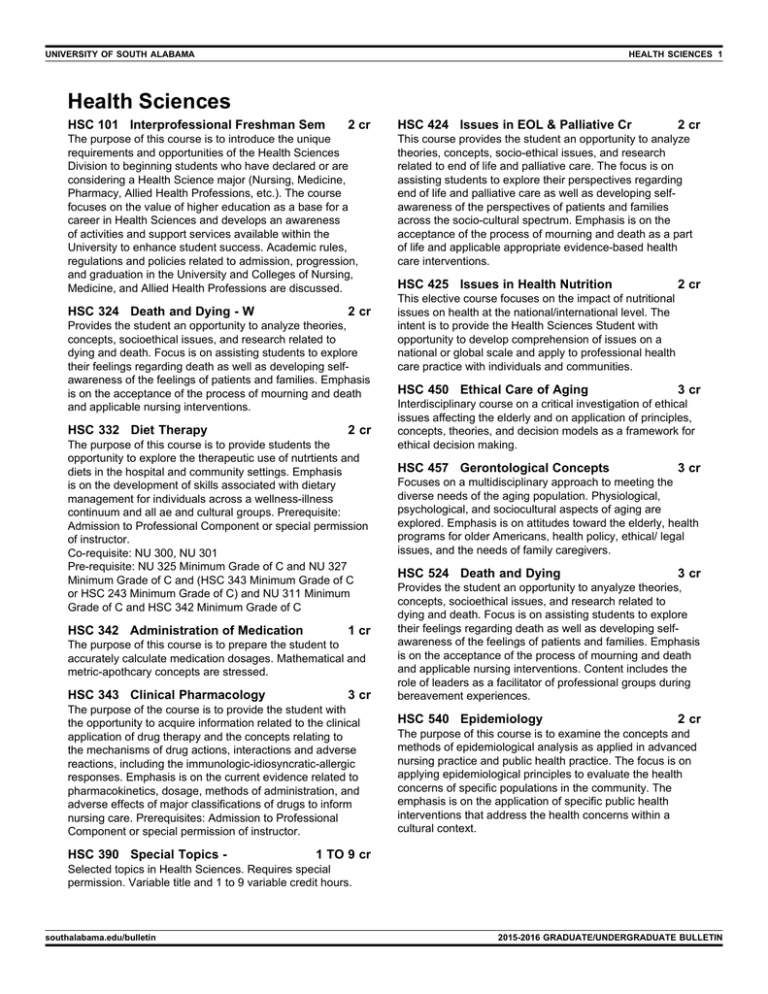
UNIVERSITY OF SOUTH ALABAMA HEALTH SCIENCES 1 Health Sciences HSC 101 Interprofessional Freshman Sem 2 cr The purpose of this course is to introduce the unique requirements and opportunities of the Health Sciences Division to beginning students who have declared or are considering a Health Science major (Nursing, Medicine, Pharmacy, Allied Health Professions, etc.). The course focuses on the value of higher education as a base for a career in Health Sciences and develops an awareness of activities and support services available within the University to enhance student success. Academic rules, regulations and policies related to admission, progression, and graduation in the University and Colleges of Nursing, Medicine, and Allied Health Professions are discussed. HSC 324 Death and Dying - W 2 cr Provides the student an opportunity to analyze theories, concepts, socioethical issues, and research related to dying and death. Focus is on assisting students to explore their feelings regarding death as well as developing selfawareness of the feelings of patients and families. Emphasis is on the acceptance of the process of mourning and death and applicable nursing interventions. HSC 332 Diet Therapy 2 cr The purpose of this course is to provide students the opportunity to explore the therapeutic use of nutrtients and diets in the hospital and community settings. Emphasis is on the development of skills associated with dietary management for individuals across a wellness-illness continuum and all ae and cultural groups. Prerequisite: Admission to Professional Component or special permission of instructor. Co-requisite: NU 300, NU 301 Pre-requisite: NU 325 Minimum Grade of C and NU 327 Minimum Grade of C and (HSC 343 Minimum Grade of C or HSC 243 Minimum Grade of C) and NU 311 Minimum Grade of C and HSC 342 Minimum Grade of C HSC 342 Administration of Medication 1 cr The purpose of this course is to prepare the student to accurately calculate medication dosages. Mathematical and metric-apothcary concepts are stressed. HSC 343 Clinical Pharmacology 3 cr The purpose of the course is to provide the student with the opportunity to acquire information related to the clinical application of drug therapy and the concepts relating to the mechanisms of drug actions, interactions and adverse reactions, including the immunologic-idiosyncratic-allergic responses. Emphasis is on the current evidence related to pharmacokinetics, dosage, methods of administration, and adverse effects of major classifications of drugs to inform nursing care. Prerequisites: Admission to Professional Component or special permission of instructor. HSC 390 Special Topics - HSC 424 Issues in EOL & Palliative Cr 2 cr This course provides the student an opportunity to analyze theories, concepts, socio-ethical issues, and research related to end of life and palliative care. The focus is on assisting students to explore their perspectives regarding end of life and palliative care as well as developing selfawareness of the perspectives of patients and families across the socio-cultural spectrum. Emphasis is on the acceptance of the process of mourning and death as a part of life and applicable appropriate evidence-based health care interventions. HSC 425 Issues in Health Nutrition 2 cr This elective course focuses on the impact of nutritional issues on health at the national/international level. The intent is to provide the Health Sciences Student with opportunity to develop comprehension of issues on a national or global scale and apply to professional health care practice with individuals and communities. HSC 450 Ethical Care of Aging 3 cr Interdisciplinary course on a critical investigation of ethical issues affecting the elderly and on application of principles, concepts, theories, and decision models as a framework for ethical decision making. HSC 457 Gerontological Concepts 3 cr Focuses on a multidisciplinary approach to meeting the diverse needs of the aging population. Physiological, psychological, and sociocultural aspects of aging are explored. Emphasis is on attitudes toward the elderly, health programs for older Americans, health policy, ethical/ legal issues, and the needs of family caregivers. HSC 524 Death and Dying 3 cr Provides the student an opportunity to anyalyze theories, concepts, socioethical issues, and research related to dying and death. Focus is on assisting students to explore their feelings regarding death as well as developing selfawareness of the feelings of patients and families. Emphasis is on the acceptance of the process of mourning and death and applicable nursing interventions. Content includes the role of leaders as a facilitator of professional groups during bereavement experiences. HSC 540 Epidemiology 2 cr The purpose of this course is to examine the concepts and methods of epidemiological analysis as applied in advanced nursing practice and public health practice. The focus is on applying epidemiological principles to evaluate the health concerns of specific populations in the community. The emphasis is on the application of specific public health interventions that address the health concerns within a cultural context. 1 TO 9 cr Selected topics in Health Sciences. Requires special permission. Variable title and 1 to 9 variable credit hours. southalabama.edu/bulletin 2015-2016 GRADUATE/UNDERGRADUATE BULLETIN UNIVERSITY OF SOUTH ALABAMA HEALTH SCIENCES 2 HSC 541 Disaster Management 2 cr HSC 597 Adv Pharm Complex Dyslipiderni 2 cr The purpose of this course is to examine the principles of disaster management and the implications for interdisciplinary health care. The focus is on the application of techniques and interventions in a variety of natural and man-made disasters or bioterrorism events. The emphasis is on critical-thinking, management of resources, terrorism, environmental safety, and personal well-being. This course serves as a foundational course in the Clinical Lipidology Subspecialty program. The purpose of this didactic course is to prepare the Clinical Lipid Specialist student to evalute advanced pharmacologic options in treating those with selected health care needs across the lifespan. HSC 542 Biostatistics and Informatics This course serves as a final course in the Clinical Lipidology Subspecialty program. The purpose of this didactic course is to prepare the Clinical Lipid Specialist student to evaluate and manage complex dyslipidernia in those with selected health care needs across the lifespan. 3 cr The purpose of this course is to provide the biostatistical and informatics framework for advanced practice nursing in public health. The focus is on the concepts and methods of biostatistical and informatics analysis as it is applied in the health sciences. The emphasis is on the application of appropriate biostatistical methods and technological tools to specific studies in public health. HSC 550 Ethical Cons in Care of Aging 3 cr Interdisciplinary course on critical investigation of ethical issues affecting the elderly and on application of principles, concepts, theories, and decision models as a framework for ethical decision making. HSC 570 Transcultural Health Care 1 TO 3 cr Emphasis is on appreciation of the attitudes, customs, and values of people in a variety of cultures and on utilization of this knowledge in planning health care for people in multiple settings. HSC 571 Managing Health Care Personnel 3 cr The purpose of this course is to analyze frameworks for managing health care personnel. Emphasis is on current legal and governmental directives regulating human resource management, employee relations, recruitment and retention, ethics, and motivational issues in health care management. HSC 590 Special Topics 1 TO 6 cr Study of topics significant to the health professions. Content varies and may be repeated. HSC 595 Evidence Basd Lipid Practice 2 cr This course serves as a foundational course in the Clinical Lipidology Subspecialty program. The purpose of this didactic course is to prepae the Clinical Lipid Specialist student to evaluate CVD epidemiology, cardiometabolic risk, and evidence based lipid practice in those with selected health care needs across the lifespan. HSC 596 Adv Vascular Biology 2 cr This course serves as a foundational course in the Clinical Lipidology Subspecialty program. The purpose of this didactic course is to prepare the Clinical Lipid Specialist studetn to evaluate lipoprotein metabolism and vascular biology in those with selected health care needs across the lifespan. southalabama.edu/bulletin HSC 598 Diag/Mgt C-plex Dyslipidernia HSC 601 Into to Introprofessional Ed 2 cr 1 cr The purpose of this course is to introduce nursing students and occupational therapy students to the concepts of interprofessional education. Students will gain an understanding of their own role in healthcare as well as the scope of the role of another health profession. Students will learn how to function in an interprofessional team and carry this knowledge, skill, and value into their future practice, ultimately providing interprofessional patient care as part of a collaborative team that is focused on improving patient outcomes. Interprofessional teams are composed of members from different health professions who have specialized knowledge, skills, and abilities with the goal of providing patient-centered care in a collaborative manner. The team establishes a common goal and using their individual expertise, and works in concert to achieve patientcentered care. In this model, joint decision making is valued and each team member is empowered. Students will be introduced to core competencies in interprofessional care and utilize Fennel's Four Phase Model for understanding and treating multiple chronic conditions for adults, elders, and returning veterans. Pre-requisite: AHN 591 Minimum Grade of C and AHN 559 Minimum Grade of C and AHN 581 Minimum Grade of C and AHN 588 Minimum Grade of C and AHN 589 Minimum Grade of C HSC 602 Team Building 1 cr This online course will allow students to examine the specific impact of cultural, ethical, and religious factors on ethical health-care decision-making and focuses on the relationships among the professions, joint relationships with patients, the quality of cross-professional exchanges, and interprofessional considerations in health care delivery and in formulating public health policies, programs, and services. The focus of the course is derived from the approach utilized in the Core Competencies for Interprofessional Collaborative Practice (2011). Structured content introduces the topic and will allow teams of students to practice problem solving and ethical decision-making within an interprofessional team. Pre-requisite: HSC 601 Minimum Grade of C 2015-2016 GRADUATE/UNDERGRADUATE BULLETIN UNIVERSITY OF SOUTH ALABAMA HEALTH SCIENCES 3 HSC 603 Assmnt Vulnerable Populations 1 cr This online interdisciplinary course will implement evidence based and collaborative models to assess the needs of vulnerable populations who have multiple physical needs such as those evidenced by adults, elders, and returning veterans with multiple chronic illnesses and/or acute injury. The student will synthesize, critique, and apply evidence to improve patient care outcomes. In this mentored and supervised experience, the student will work in groups with the faculty to complete an assessment of need in these populations. Pre-requisite: HSC 602 Minimum Grade of C HSC 690 Special Topics- 1 TO 9 cr Study of health professional topics at the doctoral level. Credit hours will vary based on student need and depth of course subject matter. Content will vary and may be repeated up to 9 credits. Requires special permission. southalabama.edu/bulletin 2015-2016 GRADUATE/UNDERGRADUATE BULLETIN

